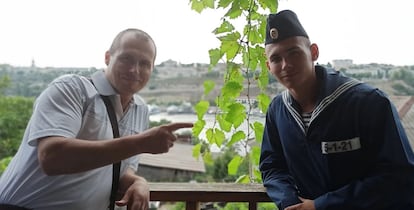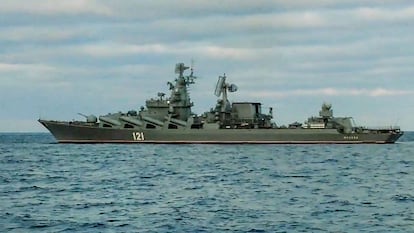Russian prosecutor admits 600 recruits were illegally sent to Ukraine war
The father of a young man who was doing his military service and died in the sinking of the ‘Moskva’ warship is defying the silence of the Kremlin


The sinking of the missile cruiser Moskva, the flagship of the Russian Black Sea fleet, cost Yegor Shkrebets his life in mid-April. The young man was doing his military service and therefore legally should not have been in a combat zone. After his death, his father began a crusade to break the silence of the Armed Forces and demand justice. Yegor had not been the only young Russian sent to fight in the offensive against Ukraine. This Tuesday, the Prosecutor’s Office of one of the districts in which the Russian army is divided has recognized that some 600 recruits have participated in the hostilities and are going to be withdrawn from service. The avowal was made by Artur Yegiyev, military prosecutor of the Western Military District of Russia, Disciplinary measures for this violation of the law will predictably fall on a dozen officers targeted by the public prosecution.
“The recruits are not participating and will not participate in the fighting. There will also be no additional recruitment of reservists,” President Vladimir Putin had stressed in a message on March 8. Two days later, the spokesman for the Ministry of Defense, Igor Konashenkov, admitted that they had detected “several cases” that contradicted Putin’s words, but that those recruits would soon return home. Some of the young people had been identified following their capture by Ukraine, according to Defense Minister Sergei Shoigu.
Military service is compulsory in Russia between the ages of 18 and 27, but only professional soldiers, who have signed an employment contract with the armed forces, can be deployed in a conflict. However, Yegor Shkrebets was doing his military service when the Moskva was sunk. “All those responsible [for the sinking] must be stripped of their insignia and severely punished,” his father, Dmitri Shkrebets, has demanded over and over again on his social networks.
His search for justice these two months has earned him some notoriety in Russia. Shkrebets keeps his opinion about the offensive to himself, and has not criticized it. He also shows reverential respect for the armed forces as an institution. But his comments have placed many commanders in an uncomfortable situation, since he is asking for accountability “even in the high command of the Black Sea Fleet.”
The sailor’s father asked the armed forces what had happened to his son. The answer came in a letter from the Military Prosecutor’s Office, which the man posted in early May on his Vkontakte profile, the Russian equivalent of Facebook. “The ship on which Y. D. Shkrebets served did not enter the territorial waters of Ukraine and is not included in the list of military units and formations involved in the special military operation. On April 13, 2022, during an emergency that led to her sinking, he [Yegor] disappeared. The search has not yielded a positive result and the location of your son is unknown,” the letter said.
Although the Russian government denied for months that Moskva participated in the fighting, on Tuesday the Telegram channel of the Russian Defense Ombudsman revealed that the mother of a wounded man on the ship, Gulnaz Urazayeva, was informed that the crew had been included in the list of participants in the military campaign to “protect their social rights and ensure that the families receive the payments” provided.
Jail for criticizing the army
The loss of his son has fueled criticism from Shkrebets, who also faces the prospect of prison under new legislation, if he is considered to have discredited the army. For this reason, Shkrebets has sought a lawyer among his followers to supervise his statements. “If in the following publications you see any legal problems, let me know, please, to correct them. I can’t afford any missteps,” he said on May 31.
However, a few days later he got a scare. On June 3, he told the newspaper Nastoyaschee Vremia, (which has been declared a “foreign agent” by the authorities) that “several members of a serious department” that he did not specify came to his house to take his laptop and inspect it under the accusation that “messages were sent to certain organizations with bomb threats” from this computer. Shkrebets, who denies the accusation, claims not to know who those people were, although he is considering two options: foreign or Russian agents.

The recruit’s father claims to be fighting “against a wall of silence” in the armed forces, although he makes distinctions. “The leadership of the Black Sea Fleet behaves decently and approaches all parents, but the lower ranks behave badly with other parents, not with me,” he says.
It is precisely this category of officers that is being targeted for sending hundreds of young recruits to Ukraine. This Tuesday, the Military Prosecutor’s Office of the Russian Western Military District, one of the areas in which the country’s troops are distributed, estimated that some 600 young people were deployed to the front. “A dozen commanders have been responsible for this. For these violations of the law, disciplinary measures will be taken and they could be fired,” explained the military prosecutor Artur Yegiyev.
On March 9, the same day that the presence of some recruits on the battlefield became known, Putin’s spokesman, Dmitry Peskov, stressed that the president was not responsible for it. “Before the start of the special military operation, on the instructions of the President of Russia, the Supreme Commander-in-Chief Vladimir Putin, all commanders of the armed forces were instructed to exclude conscripts from any tasks in the Ukrainian territory,” stressed the representative of the Kremlin.
Putin’s popularity has skyrocketed since he confronted NATO at the end of 2021, and last March he had a 83% approval rating among Russians, according to the Levada sociological research center, also considered a “foreign agent” by the Kremlin. However, the president is not lowering his guard; he knows that the armed forces are one of the sacred institutions of the country and that the voices of the parents of the military are very strong. “Let us be a mass of honest people, who do not consider themselves liberals or deaf-and-dumb armchair patriots. Let us be free citizens of our country! Support me, people!” was one of the last messages from Shkrebets on his social networks.
Putin dismantles stadium surveillance to reinforce controlled territories in Ukraine
The Russian president, Vladimir Putin, has decreed an Interior Ministry reform that liquidates the department in charge of security in stadiums and mass events, in order to reinforce the deployment of Russian security in the Ukrainian territories it controls. “These are the demands of the times. Everything is clear enough, and it is almost not necessary to give explanations," said the president's spokesman, Dmitri Peskov, about the future mission of the security agents.
Some lawmakers in the State Duma have been even clearer. “Now it is important to restore order in the liberated territories [as Russia calls them]”, said Kirill Kabanov, chairman of the parliament committee against corruption, in statements to Komsomólskoya Gazeta. “It is logical to expect a wave of crime soon, until the authorities are fully established, and the National Guard cannot replace the police.”
The media outlet Kommersant reported that the agents will be sent to the Donbas region. A new post of deputy minister of the interior will be created to “strengthen the moral stability” of the police officers, that is, to ensure their loyalty. This will entail a restructuring of the ranks and a salary increase for the current staff.
The National Guard, created a few years ago, is a mini-army that only answers to the Russian president and is independent from the Ministry of Defense. Its units include riot squads. The eliminated department of the Interior Ministry was created in 2014 to protect the Sochi Winter Olympics and the 2018 World Cup. Its mission was to keep ultras groups under control and prevent disturbances in sports venues.
“We don't need a department for international sporting events. With the sanctions, Russian athletes have been prohibited from participating in international competitions," noted Kabanov, after highlighting that the pandemic had already affected large events starting in 2020.
Tu suscripción se está usando en otro dispositivo
¿Quieres añadir otro usuario a tu suscripción?
Si continúas leyendo en este dispositivo, no se podrá leer en el otro.
FlechaTu suscripción se está usando en otro dispositivo y solo puedes acceder a EL PAÍS desde un dispositivo a la vez.
Si quieres compartir tu cuenta, cambia tu suscripción a la modalidad Premium, así podrás añadir otro usuario. Cada uno accederá con su propia cuenta de email, lo que os permitirá personalizar vuestra experiencia en EL PAÍS.
¿Tienes una suscripción de empresa? Accede aquí para contratar más cuentas.
En el caso de no saber quién está usando tu cuenta, te recomendamos cambiar tu contraseña aquí.
Si decides continuar compartiendo tu cuenta, este mensaje se mostrará en tu dispositivo y en el de la otra persona que está usando tu cuenta de forma indefinida, afectando a tu experiencia de lectura. Puedes consultar aquí los términos y condiciones de la suscripción digital.








































